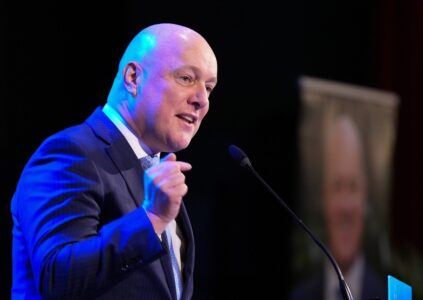
With the coalition Government’s first Budget set to be delivered soon, Prime Minister Christopher Luxon has laid out his view of the state of the country and how he plans to tackle its biggest challenges.
The Botany MP delivered a pre-Budget speech to the Auckland Business Chamber on May 15.
He covered topics including education, law and order, the economy, taxation, and infrastructure.
He said by 2020 he wants New Zealand to be characterised by three achievements including that it be a more dynamic and productive economy, with higher living standards and more opportunity.
“A country where Kiwis return home in search of a better life, instead of leaving in pursuit of higher incomes.
“Public services defined, delivered and evaluated through the lens of social investment.
“Funding devolved to communities, so Kiwis achieve their potential, leading healthier, happier lives.
“A comprehensive response to climate change, both on track to achieve our ambitious emissions targets, and resilient to the challenges of a more volatile world.”
He said his Government has taken some early steps to achieve those objectives.
“On the economy, we’re working hard to reduce inflation and enact pro-growth policies to end the recession we inherited at the end of last year.
“On social investment, [Finance Minister] Nicola Willis announced last week that this year’s Budget would include funding to embed social investment in the delivery of services across government.
“It’s early days and there’s plenty more to do.
“But in the coming months, you’ll hear more from me about how we define and achieve each of those strategic objectives – what success might look like by 2040 and how we get there.”
Luxon said Kiwis voted for the coalition parties to do three key things, being rebuild the economy, restore law and order, and deliver better public services.
“We’ve already made tremendous progress. Take our plan to rebuild the economy.
“Since we came into office in November, there has been a steady march of reform designed to unshackle business, reduce inflation, and create the conditions for growth.
“We are giving business the confidence to hire, by restoring 90-day trials and cancelling compulsory union bargaining.”
He said the Government is dismantling red tape, putting together an infrastructure pipeline, and placing water assets back into community ownership.
Inflation has fallen to four per cent, from its peak of more than seven per cent and food inflation has “collapsed” to 0.8 per cent, with fruit and veggie prices falling from this time last year, Luxon said.
“Average mortgage rates are slowly showing signs of softening – falling around 20 basis points from their peak in October last year.
“And the recovery in business confidence since last year suggests that while conditions are difficult, the future looks bright for both the boardroom and the building site.
“I accept that relief will not be immediate.
“Economic history and our own recent experience show us yet again that inflation has a way of sinking its teeth into an economy – driving higher interest rates, declining economic growth, and rising unemployment.
“Unwinding those pressures has been and will continue to be tough.
“And when Government puts its foot on the spending gas, as has been the case in recent years, the job becomes that much harder.
“It might feel good at Budget time, but there’s absolutely no kindness in spending up large, only to see businesses close and families go without as the consequence of inflation.
“So, it won’t be a surprise that as we head into the Budget, the big job back in Wellington is getting Government spending back under control.
Luxon said while the economy has stagnated in recent years, the size of the state has surged.
In per capita terms, the economy is just three per cent larger than it was at the end of 2017.
“By contrast, Government spending per capita has grown by more than 50 per cent.
“The result – higher taxes, more debt to fund the shortfall, and an economic engine dependent on the interventions and spending decisions of ministers to maintain momentum.
“No family would look at that growth in spending relative to income and describe it as responsible. So, we’re doing exactly what we said we would do.
“We’re cutting the waste and restoring a culture of fiscal discipline.”










